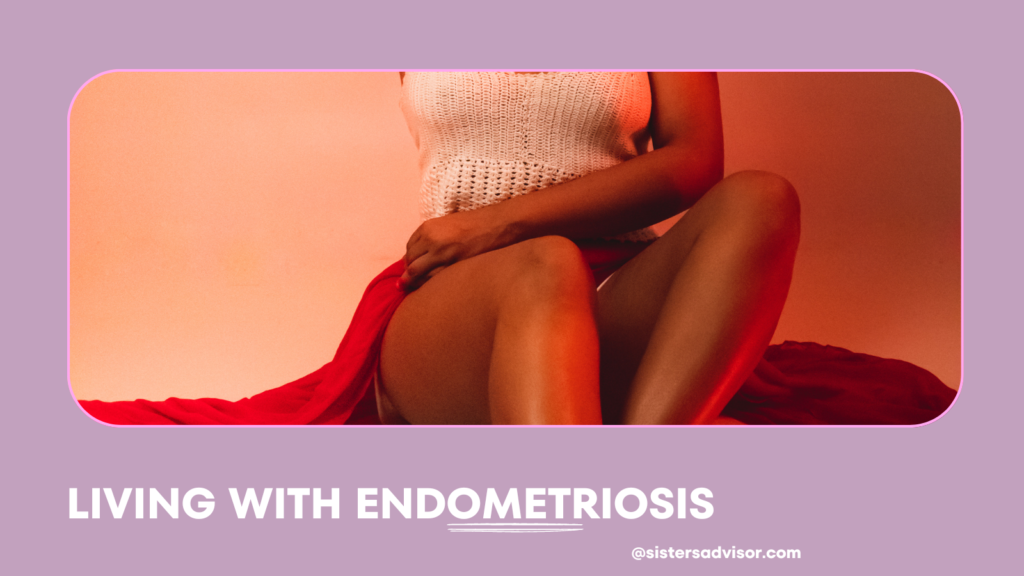Living with Endometriosis

Do you have Endometriosis, or do you know someone currently suffering from the silent disease? You may be a supportive husband reading this with a wife going through this journey. A mom with a daughter, trying to find answers. A concerned family member, watching someone you love battling every day. Or maybe just a friend, like myself.
What is Endometriosis? In what ways does it impact the health of women?
Endometriosis is a condition resulting from the appearance of endometrial tissue outside the uterus, causing pelvic pain. Endometriosis has crushed many dreams, especially when it comes to motherhood. It has shattered dreams of traveling the world, being a full-time employee, and becoming a parent. For many, getting out of bed without a painkiller is not an option. The unbelievable thing with this disease is that you have to undergo surgery just for a diagnosis, and the actual cause of Endometriosis is unknown, making it hard to find a cure.
It’s not a question of age, as women can be diagnosed as young as 15 or older than 40. Imagine being a teenager in high school and going through this type of pain with no knowledge of what’s happening to your body.
There are four stages to Endometriosis, from stage 1 being minimal to stage 4, which can be very severe. However, not every case of endo is the same; the stage of Endometriosis you have does not represent the amount of pain you might experience. A woman with stage one Endometriosis may experience just as much pain as a woman with stage four Endometriosis. Like my friend, many women have undergone multiple surgeries (18 in her case) but still experience pain and infertility.
So, this is about being aware of what is happening to your body. You can be suffering from this silent women killer and not even know it because you are being dismissed by your doctors and thinking you are making things up in your head. Moreover, we need to listen to our teens when they come to share their pains with us and show that we understand them. Don’t ignore any symptoms you have as insignificant. As women, we tend to do that; we care for everyone and completely ignore our pains and discomfort.
What are the symptoms and treatment options for Endometriosis?
Premenstrual symptoms include irritability, lowered mood, headache, acne, and breast tenderness.
Heavy periods with small clots
Painful periods
Irregular periods
Pain in ovaries when standing up too quick
Extreme tiredness during your monthly cycle.
Additional symptoms include pelvic pain, bloating, fatigue, pain during intercourse, abnormal bleeding, gastrointestinal symptoms, and infertility.

What to do if you notice symptoms
Questions to ask your doctors! The only dumb question is the one not asked.
Ask questions about possible causes for your symptoms and natural remedies that can help. Discuss lifestyle changes, family histories, impact on other organs, infertility, and chances of recurrences. Of course, you should get all the necessary information, so discuss surgeries, medication, and likely side effects. Google is full of people going through this, sharing questions they believe you should ask. Nevertheless, don’t settle for just one opinion; check other doctors and specialists.
Trust your gut and intuition! – Most people’s first instinct is dismissal, thinking that maybe I’m just having a bad day, the pain is not that bad, and I’ll take a painkiller. Your doctor might even tell you that your pain is normal. Most women accept that they have pain during menstruation and feel irritable all day because they are told it’s normal.
Did you know: You have two brains. Your gut is a second brain and can tell you when something isn’t right; follow up on that feeling and investigate. Don’t just settle, and don’t be afraid of upsetting your doctors because you’re being insistent.
Keep a journal! Keep records by journaling about your pain, discomfort, and questions to ask next time you visit your doctor. Remember, don’t ignore any signs or symptoms that come up. Additionally, journal the area of the body where you have the most pain, the frequency of pain, and how long the pain last.
Don’t suffer alone! Join a support group. There’s this awesome group on Facebook where people share what they are going through called Living with Endometriosis. You can be a part of a community of people who understand what you’re going through and can support you.

Last note: don’t wait on anyone. If it is to be, it’s up to me. Have that mindset when it comes to solving problems. Start finding ways to make things better for yourself. Knock on doors, get at the table, join the discussion, share your views, and be heard. Please do it for yourself and the next generation of young women growing up. Raise your voice until everyone hears and understands the problem, just as my friend is currently doing while living with Endometriosis for over 30 years.
If you think that you might be showing symptoms of endometriosis, follow up with your doctor and find support groups like Living With Endometriosis on facebook.
Follow us here for routine and information on living your best life. Check our latest blog post for Tips on How To Get Back Into Balance. Read more
Sources:
- Endometriosis. (n.d.).
hopkinsmedicine.org/health/conditions-and-diseases/endometriosis
- Endometriosis and pregnancy. (2009).
healthywomen.org/content/article/endometriosis-and-pregnancy
- Endometriosis stages: Understanding the different stages of endometriosis. (2020).
endofound.org/endometriosis-stages
- Facts about endometriosis. (2021).
endometriosis.org/resources/articles/facts-about-endometriosis/

Thank you for sharing! I struggle with endometriosis and I think it is so important to share and talk about this.
Thank you for sharing! I work with an endocrinologist who helps women struggling with endometriosis and this is a helpful article to shed light on this topic.
I suffered with this for years. My hysterectomy was very much appreciated! lol
This is very painful to have. Thank you for sharing on this important helpful topic. 😊
Pastor Natalie (ExamineThisMoment)
Letstakeamoment.com
A good piece, it is sad that most women are not keen on their health, thanks for reminding them to do so.
Some are not aware they could be suffering from endometriosis since they take menstruation pains as normal but they are not aware how much pain and symptoms are normal.
What a heartbreaking disease this is for many women. Thank you for pointing out what the symptoms are for endometriosis. It is important we understand to not ignore changes in our bodies.
Informative. I know of someone who had this illness, but never knew what it was until it was too late.
Women should prioritize their health.
Thank you for this post. A lot more information about women’s health needs to be out there!
this is so scary. it’s sad bc so much of these problems could be prevented but society, doctors don’t reveal the truth of health. eating better can solve a majority of people’s problems.
Thanks!